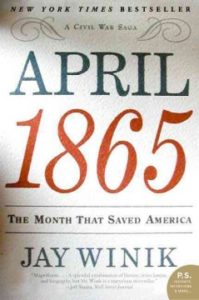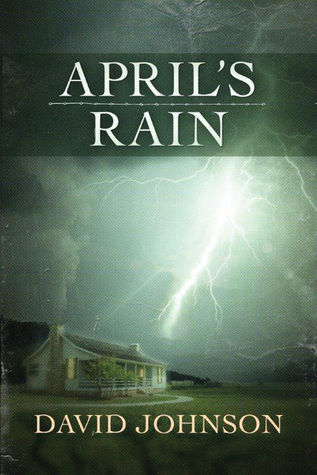April 1865: The Month That Saved America 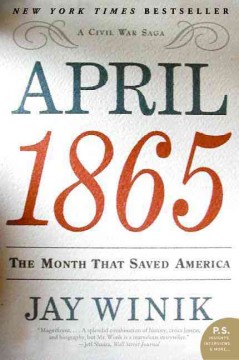
by Jay Winik
One month in 1865 witnessed the frenzied fall of Richmond, a daring last-ditch Southern plan for guerrilla warfare, Lee’s harrowing retreat, and then, Appomattox. It saw Lincoln’s assassination just five days later and a near-successful plot to decapitate the Union government, followed by chaos and coup fears in the North, collapsed negotiations and continued bloodshed in the South, and finally, the start of national reconciliation.
In the end, April 1865 emerged as not just the tale of the war’s denouement, but the story of the making of our nation.
Jay Winik offers a brilliant new look at the Civil War’s final days that will forever change the way we see the war’s end and the nation’s new beginning. Uniquely set within the larger sweep of history and filled with rich profiles of outsize figures, fresh iconoclastic scholarship, and a gripping narrative, this is a masterful account of the thirty most pivotal days in the life of the United States.
April Morning 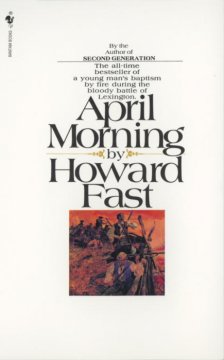
by Howard Fast
When you read this novel about April 19, 1775, you will see the British redcoats marching in a solid column through your town. Your hands will be sweating and you will shake a little as you grip your musket because never have you shot with the aim of killing a man. But you will shoot, and shoot again and again while your shoulder aches from your musket’s kick and the tight, disciplined red column bleeds and wavers and breaks and you begin to shout at the top of your lungs because you are there, at the birth of freedom—you’re a veteran of the Battle of Lexington, and you’ve helped whip the King’s best soldiers.
Eight years after losing her closest friend, Tucker struggles to keep her rebellious, self-destructive granddaughter under control. When April accidentally kills her boyfriend while defending herself from his attack, Judge Jack helps Tucker ferry her granddaughter away to Spirit Lake, a remote treatment facility in the mountains of eastern Tennessee. There, April creates a false identity, painting herself as a young socialite, and blocks Tucker’s attempts at communication.
Tucker’s grandson March, missing for eight years, is discovered half-dead, having lost both his sight and his memories. As he recovers, March’s blindness persists but fragments of his life reemerge. When he finds himself at Spirit Lake, he runs headlong into his past.
Will Tucker be able to reunite her family after their paths have splintered?
Broken April 
Two destinies intersect in this novel — that of Gjorg, a young mountaineer who has just killed a man in order to avenge the death of his older brother, and who expects to be killed himself in keeping with the code of the highlands; and that of a young couple who have come to study the age-old customs, including the blood feud.
April Blood: Florence and the Plot Against the Medici 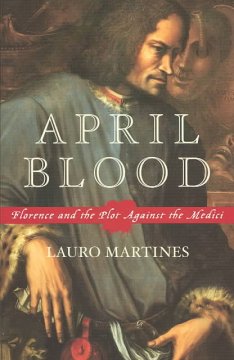
One of the world’s leading historians of Renaissance Italy brings to life here the vibrant–and violent–society of fifteenth-century Florence. His disturbing narrative opens up an entire culture, revealing the dark side of Renaissance man and politician Lorenzo de’ Medici.
On a Sunday in April 1478, assassins attacked Lorenzo and his brother as they attended Mass in the cathedral of Florence. Lorenzo scrambled to safety as Giuliano bled to death on the cathedral floor. April Blood moves outward in time and space from that murderous event, unfolding a story of tangled passions, ambition, treachery, and revenge. The conspiracy was led by one of the city’s most noble clans, the Pazzi, financiers who feared and resented the Medici’s swaggering new role as political bosses–but the web of intrigue spread through all of Italy. Bankers, mercenaries, the Duke of Urbino, the King of Naples, and Pope Sixtus IV entered secretly into the plot. Florence was plunged into a peninsular war, and Lorenzo was soon fighting for his own and his family’s survival.
The failed assassination doomed the Pazzi. Medici revenge was swift and brutal–plotters were hanged or beheaded, innocents were hacked to pieces, and bodies were put out to dangle from the windows of the government palace. All remaining members of the larger Pazzi clan were forced to change their surname, and every public sign or symbol of the family was expunged or destroyed.
April Blood offers us a fresh portrait of Renaissance Florence, where dazzling artistic achievements went side by side with violence, craft, and bare-knuckle politics. At the center of the canvas is the figure of Lorenzo the Magnificent–poet, statesman, connoisseur, patron of the arts, and ruthless “boss of bosses.” This extraordinarily vivid account of a turning point in the Italian Renaissance is bound to become a lasting work of history.
April Witch 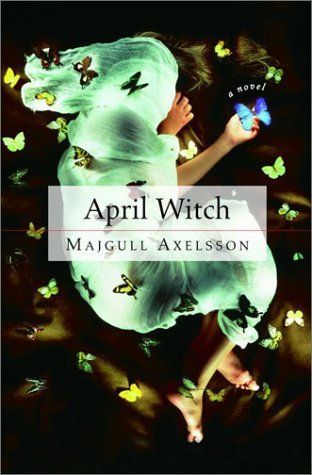
“No excuses will do anymore. Time to put my sisters in motion.”
Desiree lies in a hospital bed thinking, dreaming. One of the children born severely disabled in 1950s Sweden and then routinely institutionalized for life– and one of a very few to survive nearly to the century’s end– she cannot walk or talk, but she has other capabilities. Desire e is an April witch, clairvoyant and omniscient, leaving her own body and traveling into the world denied her.
The working-class woman who gave Desire e up at birth took in three foster daughters several years later, and even as adults they know nothing of the existence of their fourth ” sister.” Christina, abused by her psychotic birth mother and burdened by a sense of inferiority, is now a physician; Margareta, the onetime foundling, an astrophysicist who can never manage to complete her dissertation, is as restless and sensual as she was in her youth; and Birgitta, in her day the fastest, sexiest teen queen in town, is now a derelict alcoholic and substance abuser.
In spite of her physical disabilities, Desire e possesses tremendous intelligence, and she observes the world around her with great acumen. She has developed a very special relationship with her primary care physician, Dr. Hubertsson, who realizes that she could and should know something about her own background. Unbeknownst to him, she goes on to make supernatural use of this information.
Sensing that her own time is drawing to a close, Desire e also feels that one of the others has lived the life that should have been hers. One day, each of the three women– Christina, Margareta, Birgitta– receives a mysterious letter that inspires her to examine her past and her present, setting into motion a complex fugue of memory, regret, and confrontation that builds to a shattering climax.
April Witch created a furor upon its original publication in Sweden, where it was an immense bestseller. Addressing themes of mother-daughter relationships, competition between women, and the failures of Sweden’s postwar welfare state, it is foremost a thrillingly written and fascinating story.


